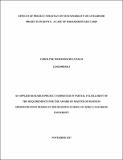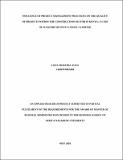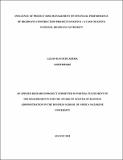| dc.description.abstract | Project management strategy was found to be the key on sustaining projects in terms of its economic and social impact to project stakeholders. The Dadaab refugee camp has been a home to over 500,000 refugees for the past three decades. Various donors as well as well-wishers in partnership with United Nations High Commission for Refugees (UNHCR) have initiated projects to sustain the livelihood of the refugees’. Several projects that were initiated by humanitarian agencies and the Government have not been sustainable in addressing the needs of the high population and the influx of refugees in Dadaab refugee camp. Some projects failed while others were unable to deliver on the basic needs of the refugees. Due to weak Project Management Strategies, projects have failed or become unsustainable. The research aim was to assess the effect of project strategies that were adopted by project managers on Livelihood Project Sustainability in Dadaab refugee camp. The research was guided by capability theory and system theory on sustainability. The target population was 143 i.e.13 project managers and 130 beneficiaries of livelihood projects involved in implementing humanitarian projects in the agencies at the refugee camp. The sample size was 105 respondents comprising of 13 project managers and 92 project beneficiaries. Sampling procedure was done through purposive sampling methods. The study instruments, which were used in collecting data, comprise of two questionnaires, one for the project managers and the other for project beneficiaries. Data analysis was done using SPSS version 21.0 and data was summarized using charts and tables. Hypothesis testing was done using multiple regression analysis. The study findings were that project training had a beta (β =0.206) for project managers and a beta (β=-0.202) for project beneficiaries, project marketing had a beta (β=-0.432) for project managers and beta (β=0.053) for project beneficiaries, project supply of raw materials had a beta (β=0.195) for project managers and beta (β=0.006) for project beneficiaries. This infers that as per the project managers, project training influence project sustainability to a great extent followed by supply of raw materials and project marketing had the negative effect on project sustainability. As per the project beneficiaries, project marketing has a highest positive significant effect on project sustainability followed by raw materials supply and project training has a negative significance effect on project sustainability. This research may benefit existing project managers and humanitarian agencies in formulating and assessing project management overseers, consumers and policy makers so that they can continue to sustain available projects in the refugee camp and keep improving on the welfare of refugees in the camp before they undergo repatriation. | en_US |




